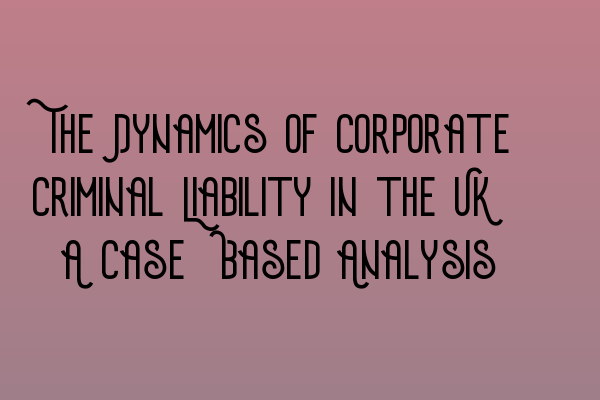The Dynamics of Corporate Criminal Liability in the UK: A Case-Based Analysis
Corporate criminal liability is a topic that has gained significant attention and scrutiny in recent years. With the rise in corporate scandals and unethical business practices, the legal framework surrounding corporate criminal liability has evolved to hold companies accountable for their actions. In this blog post, we will delve into the dynamics of corporate criminal liability in the UK, providing a case-based analysis to understand the implications and challenges faced by corporations in the face of criminal charges.
The Legal Framework of Corporate Criminal Liability
Before discussing the case studies, it is important to first understand the legal framework of corporate criminal liability in the UK. The main principle behind corporate criminal liability is that a company can be held criminally responsible for the actions of its employees, agents, or directors if they commit an offense within the scope of their employment or on behalf of the company.
The key legislation governing corporate criminal liability in the UK is the Corporate Manslaughter and Corporate Homicide Act 2007. This act introduced the offense of corporate manslaughter, which holds corporations liable if their gross corporate failures result in a person’s death. The act establishes a duty of care owed by corporations to their employees and the public, emphasizing the importance of maintaining health and safety standards.
Case Study 1: R v. XYZ Construction Ltd.
In the case of R v. XYZ Construction Ltd., the construction company was charged with corporate manslaughter following the death of a worker on one of their sites due to a serious safety breach. The court determined that the company had failed to implement adequate safety measures and had neglected its duty of care towards its employees. As a result, the company was held criminally liable, leading to significant financial penalties and reputational damage.
This case highlights the importance of maintaining proper health and safety standards within corporations. It serves as a reminder that companies must prioritize the well-being of their employees and ensure compliance with relevant regulations to avoid corporate manslaughter charges.
Case Study 2: R v. ABC Pharmaceuticals
In the case of R v. ABC Pharmaceuticals, the pharmaceutical company was charged with corporate fraud after it was discovered that they had deliberately misrepresented the efficacy of one of their drugs. The court found that the company had engaged in a systematic scheme to deceive healthcare professionals and patients for financial gain. The company was held criminally liable for fraud, resulting in substantial fines and the loss of public trust.
This case demonstrates the importance of corporate integrity and ethical behavior. It illustrates that intentionally misleading customers or stakeholders can have severe legal consequences, leading to financial penalties and irreparable damage to a company’s reputation.
Challenges and Implications
Corporate criminal liability poses several challenges and implications for companies operating in the UK. Firstly, the potential for legal repercussions serves as a deterrent to unethical behavior and encourages companies to adopt rigorous compliance programs. This helps prevent corporate wrongdoing and promotes a culture of integrity within organizations.
However, the complexity of corporate structures and the involvement of multiple individuals in decision-making processes can make it difficult to assign criminal liability to a specific entity or individual. This can result in challenges during investigations and prosecutions, requiring thorough evidence gathering and legal analysis.
Furthermore, the financial and reputational consequences of corporate criminal liability can be devastating for companies. The fines and penalties imposed can significantly impact a company’s bottom line, and the loss of public trust can be difficult to regain. This highlights the need for companies to proactively manage their legal risks and ensure compliance with applicable laws and regulations.
Conclusion
In conclusion, the dynamics of corporate criminal liability in the UK are complex and ever-evolving. Companies must be aware of their legal obligations and prioritize ethical conduct to mitigate the risk of criminal charges. Organizations must invest in robust compliance programs, ensuring strict adherence to health and safety standards, financial regulations, and ethical business practices.
To prepare for the challenges of corporate criminal liability, individuals pursuing a career in criminal law are encouraged to take SQE 1 practice exam questions and SQE 1 practice mocks FLK1 FLK2 to enhance their knowledge and skills. Additionally, SQE 2 preparation courses are available to provide comprehensive training for those seeking to specialize in criminal law. For a complete overview of the SQE exams, including important dates, please refer to our article on SRA SQE exam dates.
